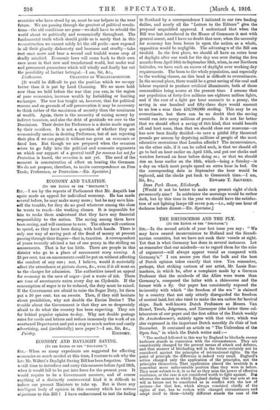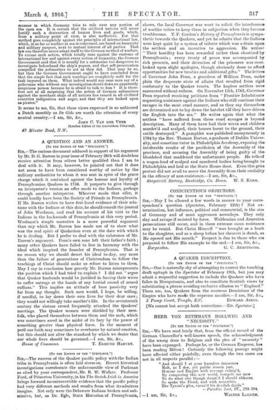THE RHINOCEROS AND EELE. FLY.
[To THE EDITOR OP TUB " SPECTATOR:1
Sm,—In the second article of your last issue you say : " We may have caused inconvenience to Holland and the Scandi- navian countries, but wo have not sunk their vessels at sight. Yet that is what Germany has done in several instances. Let us remember that our misdeeds—so to regard them for the sake
of argument—will always appear venial as compared with Germany's." I can assure you that the bulk and the best of Dutch opinion takes exactly that view. You remember, perhaps, that striking cartoon of our artist, Mr. Louis Rae- maekers, in which he, after a complaint made by a German Professor that the misdeeds of the Allies were worse than Germany's, compared the latter with a rhinoceros and the former with a fly. Our paper has consistently exposed the insincerity with which " the freedom of the sea " is claimed by a country that not only utterly disregarded the freedom of neutral land, but also tried to make the sea unfree for iseutral
ships. Such well-known Dutch Professors as Messrs. Van Hamel, Treub, Jelgersma, and Niermeyer (the latter three col- laborators of our paper and the first editor of the Dutch weekly De Amsterdammer), entirely agree with that view, which was also expressed in the important Dutch monthly De Gide of last December. It contained an article on " The Unfreedom of the Open Sea," in which the Dutch writer said :— " Thc method followed in this war by England to blockade enemy harbours stands in connexion with the circumstances. They are considerably changed by the present means of attack and defence, and that manner of blockading will in the future certainly not be considered against the principles of international rights. On the point of principle the difference is indeed very small. England's action changed only the application of the principles, not the principles themselves. That application placed the neutrals in a somewhat more unfavourable position than they were in before. They must submit to it, in so far as they miss the power of effective resistance, or the case is not considered worth to fight against. B4 whereas the manner in which England during this war acts at sea will in future not be considered as in conflict with the law of nations—for that law, which always consisted chiefly of the rights of war, has to reckon with changed circumstances and adapt itself to them—totally different stands the case of the manner in which Germany tries to rule over any portion of the open sea It is certain that the civilized nations will never justify such a destruction of human lives and goods, which, from a military point of view, is also ineffective. For that method goes completely against the principles of international law, which, in so far as warfare at sea is concerned, are based on humanity and militarypurpose, next to mutual interest of all parties. That Jaw can therefore never adapt itself to the German method of warfare. To excuse such action, which totally runs against the customs of international law and against every notion of humanity, the German Government said that it is usually for a submarine too dangerous to investigate beforehand the ship's papers, and that self-preservation compelled the submarines to act as they did. That may be so, but then the German Government ought to have concluded from that the simple fact that such warships are completely unfit for the task imposed on them. What indeed would any sane man say of a policeman who without any investigation shoots down an apparently suspicious person because he is afraid to talk to him ? It is there- fore not at all surprising that the action of German submarines against the merchant ships of all nations has caused in all civilized countries indignation and anger, and that they are looked upon as pirates."
It seems to me, Sir, that these views expressed in so unbiassed a Dutch monthly as De Gids are worth the attention of every neutral country.—I am, Sir, &c.,
Joni C. VAN DER VEER
(London Editor of the Amsterdam Telegraaj).
Minster Road, N.W.



































 Previous page
Previous page